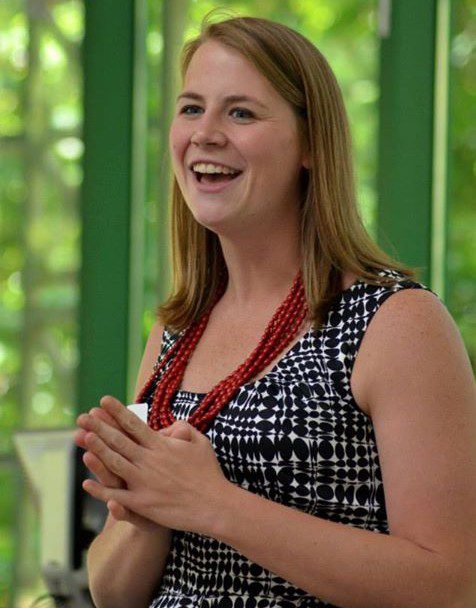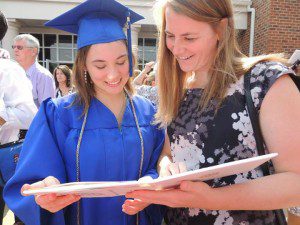Bridging the gap

The blunt truth is, after her parents divorced when she was 10 Furman wouldn’t have been on many people’s list of potential futures for Casey Crisp ’09. It was on the only one that mattered, however.
“My dad called Furman’s main phone number and said I’d love to talk to someone about something my daughter could get involved with this summer to be around some good people,” Crisp said. “He said, I don’t really know what I’m asking for but . . . I feel like she needs something that I can’t really provide.”
Judith Chandler, Ph.d., then the director of Furman’s Bridges to a Brighter Future program, quickly got Crisp involved with the school’s scopes youth program. Maybe it didn’t save her life. Then again, maybe it did.
“My mom still does and did at the time really struggle with drug addiction and alcoholism. It was really bad growing up. I have a very limited relationship with her even now,” Crisp said. “We were very poor. I remember there were weeks where we only ate beans, where we didn’t have enough gas to get to school.”
Crisp clung to the structure the Scopes camps offered, going back to campus every year and becoming a counselor for younger campers. Still, actually attending Furman—or any other college—remained little more than a fantasy when she entered high school.
Chandler knew by that point, however, that Crisp couldn’t have been a more perfect candidate for Bridges to a Brighter Future if she’d been created in a lab. Established in 1997 thanks to the vision and founding endowment of Mamie Jolley Bruce, Bridges is a seven-year program designed to help low-income and first-generation students in the Greenville area “whose potential outdistances their circumstances” earn college degrees from any school of their choosing.
Candidates are nominated by their guidance counselors, and once Crisp was selected at the end of the ninth grade she joined her classmates in attending four-week summer residential programs at Furman for three years and participating in a year-round monthly academic support program called Bridges Saturday College. Crisp excelled and was eventually admitted to the place she’d come to see as a second home.
“(Furman) was definitely where I always wanted to go. I grew up as a kid going there to feed the ducks,” Crisp said, and she credits Bridges with making her believe it could be a reality. “It was never something I felt like wasn’t going to happen.”
A “hodgepodge” of loans and financial aid, including a Bridges teacher who sometimes bought her books, allowed Crisp to pay the bills and earn a history degree with a secondary-education certification. She also soaked up everything else Furman offers, including twice being elected Chi Omega president, and when she graduated her 2009 senior class gift was $43,650 to support a scholarship for a Bridges student.
“I found a lot of value outside of the classroom, maybe too much,” she said with a laugh. “I always joke that I really wish I would have spent as much time focused on my classes as I did the extracurriculars, but I just really wanted to take advantage of everything that I could there.”
Not that things were always fun. The final component of Bridges is “Crossing the Bridge,” which provides academic and emotional support to students during their time in college in the form of personal visits, texts, and phone calls. Crisp needed every bit of it once she entered a world that was foreign in many ways while simultaneously trying to maintain relationships with family members who didn’t support and sometimes resented her attempts to change her life.
“It’s hard to come somewhere like Furman and have all of that stuff as part of your background,” Crisp said. “My junior and senior year I wouldn’t come home for Christmas break because our house was just so bad and there was no money and there was no telling if the power was going to be on or if I was going to have a place to sleep, those kinds of things . . . Parents weekend, I remember people would come to town and take (my classmates) to these really amazing dinners. Parents weekend was really hard for me, because it was like, I don’t have this.”
What she did have, however, were others in Bridges.
“In Bridges we talk a lot about how do you own your story and share that in a way that leaves you feeling empowered versus feeling resentful, because it’s really easy to fall into that trap,” Crisp said. “I always wanted to forget who I was and not be the kid of drug-addicted parents. I didn’t want that to be my life anymore. A big benefit of Bridges was having other people who understood what you were going through.”
That’s the goal, according to Tobi Kinsell, who headed Bridges for 11 years.
“That’s a mistake we make by assuming that once you get to college everything’s going to be OK, because actually those challenges that students have . . . of poverty and low educational attainment come with them,” she said.
The circumstances that make teenagers eligible for Bridges are unimaginable to most people, but even with assistance current director Pam Davis says it’s ultimately the kids who do the heavy lifting.
“We’re looking for that student who we feel like Bridges is going to work for,” she said. “We see that they’re going to be able to dig deep and persevere and meet us halfway. I think it’s just that combination of the program and all the support that Bridges provides but also that student who is going to be able to shine.”
It’s not a coincidence Kinsell uses similar words to describe her one-time protégé and longtime friend.
“Casey just has a tremendously bright personality . . . She’s got a lot of energy and a light in her, and that definitely helps,” Kinsell said. “What separates Casey from other students like her is her grit and determination.”
After graduation, Crisp taught high school for a couple of years and took a job at Bridges before deciding to pursue a Masters in Higher Education Administration at George Washington University. She says she misses Bridges “a lot,” but that feeling made her realize she wants to help others facing the same seemingly insurmountable hurdles that blocked her way.
“I don’t know that I knew this when I was in college, but I would say that my passion area has definitely become college access,” she said. “I know that my heart is with working with students who need support. In my own life I don’t know how I would have made it without those people along the way. They came in many different forms and at many different times, but I definitely didn’t go that path alone.”
And as hard as Crisp has worked to escape her past, she’ll never forget or regret it. She has yet to miss a Furman Homecoming, and she will always be thankful for the one person who was wise enough to know what he didn’t know and never stopped trying to help—her father, Al, who passed away recently.
“He really cared and wanted me to do better than him but just really didn’t know how to go about that. That really defined my family support or lack thereof,” Crisp said. “But I know me graduating from college was the most proud I think he could ever have been. I was really lucky to have him. He was always a good dad.”
For more on Bridges to a Brighter Future, click here.
